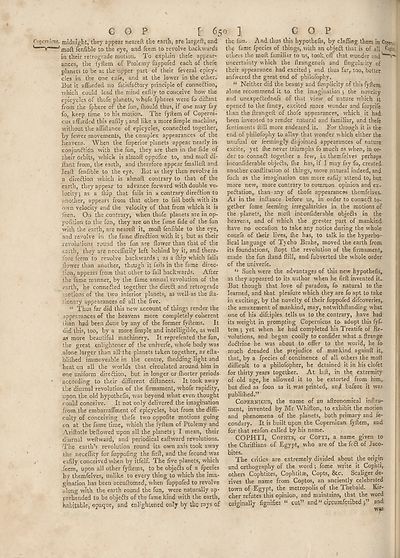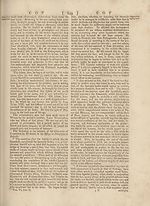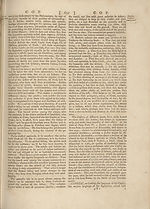Encyclopaedia Britannica, or, a Dictionary of arts, sciences, and miscellaneous literature : enlarged and improved. Illustrated with nearly six hundred engravings > Volume 6, CHI-Crystallization
(696) Page 650
Download files
Complete book:
Individual page:
Thumbnail gallery: Grid view | List view

COP
fopermcHs. midnight, they appear neareft the earth, are larged, and
v,-~V—' mod fenfible to the eye, and feem to revolve backwards
in their retrograde motion. To explain thefe appear¬
ances, the fyftem of Ptolemy fuppofed each of thefe
planets to be at the upper part of their feveral epicy¬
cles in the one cafe, and at the lower in the other.
But it afforded no fatisfa&ory principle of connexion,
which could lead the mind eafiiy to conceive how the
epicycles of thofe planets, whofe fpheres wrere fo diftant
from the fphere of the fun, fhould thus, if one may fay
fo, keep time to his motion. The fyftetn of Coperni¬
cus afforded this eafiiy j and like a more fimple machine,
without the alManee of epicycles, connefted together,
by fewer movements, the complex appearances of the
heavens. When the fuperior planets appear nearly in
conjun&ion with the fun, they are then in the fide of
their orbits, which is almofi oppofite to, and moft di-
flant from, the earth, and therefore appear fmalleft and
lead fenfible to the eye. But as they then revolve in
a direction which is aimed contrary to that of the
earth, they appear to advance forward with double ve¬
locity; as a Ihip that fails in a contrary diredtion to
another, appears from that other to fail both with its
own velocity and the velocity of that from which it is
feen. On the contrary, when thofe planets are in op-
pofition to the fun, they are on the fane fide of the fun
with the earth, are neared it, mod fenfible to the eye,
and revolv e in the fame diredlion with it; but as their
revolutions round the fun are dower than that of the
.earth, they are neceffarily left behind by it, and there¬
fore feem to revolve backwards ; as a (hip which fails
dower than another, though it fails in the fame direc¬
tion, appears from that other to fail backwards. After
the fame manner, by the fame annual revolution of the
earth, he connefled together the direct and retrograde
motions of the two inferior planets, as well as the da-
ionary appearances of all the five.
“ Thus far did this new account of things render the
appearances of the heavens more completely coherent
than had been .done by any of the former fydems. It
did this, too, by a more fimple and intelligible, as well
as more beautiful machinery. It reprefented the fun,
the great enlightener of the unfverfe, whofe body was
alone larger than all the planets taken together, as eda-
blidied immoveable in the centre, diedding light and
heat on all the worlds that circulated around him in
one uniform direction, but in longer or drorter periods
according to their different didances. It took away
the diurnal revolution of the firmament, whofe rapidity,
vjpon the old hypothefis, was beyond what even thought
could conceive. It not only delivered the imagination
from the embarraffment of epicycles, but from the diffi¬
culty of conceiving thefe two oppofite motions going
on at the fame time, which the fydem of Ptolemy and
Aridotle bedowed upon all the planets; I mean, their
diurnal weftwstrd, and periodical eadward revolutions.
The earth’s revolution round its own axis took away
the neceffity for fuppofing the fird, and the fecond was
eafiiy conceived when by itfelf. The five planets, which
feem, upon all other fydems, to be objedls of a fpecies
by themfelves, unlike to every thing to which the ima¬
gination has been accudomed, when fuppofed to revolve
along with the earth round the fun, were naturally ap¬
prehended to be objefts of the fame kind with the earth,
habitable, opaque, and enlightened only by thg rays of
COP
the fun. And thus this hypothefis, by claffing them in Copemic
the fame fpecies of things', with an objesd that is of all fophti
others the mod familiar to us, took off that wonder and*'’—^
uncertainty which the drangenefs and fingula.ity of
their appearance had excited ; and thus far, too, better
anfwered the great end of philofophy.
“ Neither did the beauty and fimplicity of this fyfteiu
alone recommend it to the imagination ; the novelty
and unexpedtednefs of that view of nature which it
opened to the fancy, excited more wonder and furprife
than the dranged of thofe appearances, which it had
been invented to render natural and familiar, and thefe
fentiments dill more endeared it. For though it is the
end of philofophy to allay that wonder which either the
unufual or feemingly disjointed appearances of nature
excite, yet (he never triumphs fo much as when, in or¬
der to conneft together a few, in themfelves perhaps
inconfiderable objedls, (lie has, if I may fay fo, created
another conditution ol things, more natural indeed, and
fuch as the imagination can mere eafiiy attend to, but
more new, more contrary to common opinion and ex¬
pectation, than any of thofe appearances themfelves.
As in the indance before us, in order to conaeCt to¬
gether fome feeming irregularities in the motions of
the planets, the mod inconfiderable objeCls in the
heavens, and of which the greater part of mankind
have no occafion to take any notice during the whole
courfe of their lives, die has, to talk in the hyperbo¬
lical language of Tycho Brahe, moved the earth from
its foundations, dopt the revolution of the firmament,
made the fun dand dill, and fubverted the whole order
of the univerfe.
“ Such were the advantages of this new hypothefis,
as they appeared to its author when he fird invented it.
But though that love of paradox, fo natural to the
learned, and that pleafure which they are fo apt to take
in exciting, by the novelty of their fuppofed difeoveries,
the amazement of mankind, may, notwithdanding what
one of his difciples tells us to the contrary, have had
its weight in prompting Copernicus to adopt this fyf-
tem ; yet when he had completed his Treatife of Re¬
volutions, and began coolly to confider what a drange
doClrine he was about to offer to the world, he fo
much dreaded the prejudice of mankind againd it,
that, by a fpecies of continence of all others the mod
difficult to a philofopher, he detained it in his clofet
for thirty years together. At lad, in the extremity
of old age, he allowed it to be extorted from him,
but died as foon as it was printed, and before it was
publilhed.”
Copernicus, the name of an adronomical indru-
ment, invented by Mr Whidon, to exhibit the motion
and phenomena of the planets, both primary and ie-
condary. It is built upon the Copernican fydem, and
for that reafon called by his name.
COPHTI, Cophts, or Copti, a name given to
the Chridians of Egypt, who are of the fed of Jaco-
bites.
The critics are extremely divided about the origin
and orthography of the word ; fome write it Cophti,
others Cophtites, Cophtitm, Copts, &c. Scaliger de¬
rives the name from Coptos, an anciently celebrated
town of Egypt, the metropolis of the Thebaid. Kir-
cher refutes this opinion, and maintains, that the word
originally fignifies “ cut” and “ cijrcumfcnbed and
t 65° 1
fopermcHs. midnight, they appear neareft the earth, are larged, and
v,-~V—' mod fenfible to the eye, and feem to revolve backwards
in their retrograde motion. To explain thefe appear¬
ances, the fyftem of Ptolemy fuppofed each of thefe
planets to be at the upper part of their feveral epicy¬
cles in the one cafe, and at the lower in the other.
But it afforded no fatisfa&ory principle of connexion,
which could lead the mind eafiiy to conceive how the
epicycles of thofe planets, whofe fpheres wrere fo diftant
from the fphere of the fun, fhould thus, if one may fay
fo, keep time to his motion. The fyftetn of Coperni¬
cus afforded this eafiiy j and like a more fimple machine,
without the alManee of epicycles, connefted together,
by fewer movements, the complex appearances of the
heavens. When the fuperior planets appear nearly in
conjun&ion with the fun, they are then in the fide of
their orbits, which is almofi oppofite to, and moft di-
flant from, the earth, and therefore appear fmalleft and
lead fenfible to the eye. But as they then revolve in
a direction which is aimed contrary to that of the
earth, they appear to advance forward with double ve¬
locity; as a Ihip that fails in a contrary diredtion to
another, appears from that other to fail both with its
own velocity and the velocity of that from which it is
feen. On the contrary, when thofe planets are in op-
pofition to the fun, they are on the fane fide of the fun
with the earth, are neared it, mod fenfible to the eye,
and revolv e in the fame diredlion with it; but as their
revolutions round the fun are dower than that of the
.earth, they are neceffarily left behind by it, and there¬
fore feem to revolve backwards ; as a (hip which fails
dower than another, though it fails in the fame direc¬
tion, appears from that other to fail backwards. After
the fame manner, by the fame annual revolution of the
earth, he connefled together the direct and retrograde
motions of the two inferior planets, as well as the da-
ionary appearances of all the five.
“ Thus far did this new account of things render the
appearances of the heavens more completely coherent
than had been .done by any of the former fydems. It
did this, too, by a more fimple and intelligible, as well
as more beautiful machinery. It reprefented the fun,
the great enlightener of the unfverfe, whofe body was
alone larger than all the planets taken together, as eda-
blidied immoveable in the centre, diedding light and
heat on all the worlds that circulated around him in
one uniform direction, but in longer or drorter periods
according to their different didances. It took away
the diurnal revolution of the firmament, whofe rapidity,
vjpon the old hypothefis, was beyond what even thought
could conceive. It not only delivered the imagination
from the embarraffment of epicycles, but from the diffi¬
culty of conceiving thefe two oppofite motions going
on at the fame time, which the fydem of Ptolemy and
Aridotle bedowed upon all the planets; I mean, their
diurnal weftwstrd, and periodical eadward revolutions.
The earth’s revolution round its own axis took away
the neceffity for fuppofing the fird, and the fecond was
eafiiy conceived when by itfelf. The five planets, which
feem, upon all other fydems, to be objedls of a fpecies
by themfelves, unlike to every thing to which the ima¬
gination has been accudomed, when fuppofed to revolve
along with the earth round the fun, were naturally ap¬
prehended to be objefts of the fame kind with the earth,
habitable, opaque, and enlightened only by thg rays of
COP
the fun. And thus this hypothefis, by claffing them in Copemic
the fame fpecies of things', with an objesd that is of all fophti
others the mod familiar to us, took off that wonder and*'’—^
uncertainty which the drangenefs and fingula.ity of
their appearance had excited ; and thus far, too, better
anfwered the great end of philofophy.
“ Neither did the beauty and fimplicity of this fyfteiu
alone recommend it to the imagination ; the novelty
and unexpedtednefs of that view of nature which it
opened to the fancy, excited more wonder and furprife
than the dranged of thofe appearances, which it had
been invented to render natural and familiar, and thefe
fentiments dill more endeared it. For though it is the
end of philofophy to allay that wonder which either the
unufual or feemingly disjointed appearances of nature
excite, yet (he never triumphs fo much as when, in or¬
der to conneft together a few, in themfelves perhaps
inconfiderable objedls, (lie has, if I may fay fo, created
another conditution ol things, more natural indeed, and
fuch as the imagination can mere eafiiy attend to, but
more new, more contrary to common opinion and ex¬
pectation, than any of thofe appearances themfelves.
As in the indance before us, in order to conaeCt to¬
gether fome feeming irregularities in the motions of
the planets, the mod inconfiderable objeCls in the
heavens, and of which the greater part of mankind
have no occafion to take any notice during the whole
courfe of their lives, die has, to talk in the hyperbo¬
lical language of Tycho Brahe, moved the earth from
its foundations, dopt the revolution of the firmament,
made the fun dand dill, and fubverted the whole order
of the univerfe.
“ Such were the advantages of this new hypothefis,
as they appeared to its author when he fird invented it.
But though that love of paradox, fo natural to the
learned, and that pleafure which they are fo apt to take
in exciting, by the novelty of their fuppofed difeoveries,
the amazement of mankind, may, notwithdanding what
one of his difciples tells us to the contrary, have had
its weight in prompting Copernicus to adopt this fyf-
tem ; yet when he had completed his Treatife of Re¬
volutions, and began coolly to confider what a drange
doClrine he was about to offer to the world, he fo
much dreaded the prejudice of mankind againd it,
that, by a fpecies of continence of all others the mod
difficult to a philofopher, he detained it in his clofet
for thirty years together. At lad, in the extremity
of old age, he allowed it to be extorted from him,
but died as foon as it was printed, and before it was
publilhed.”
Copernicus, the name of an adronomical indru-
ment, invented by Mr Whidon, to exhibit the motion
and phenomena of the planets, both primary and ie-
condary. It is built upon the Copernican fydem, and
for that reafon called by his name.
COPHTI, Cophts, or Copti, a name given to
the Chridians of Egypt, who are of the fed of Jaco-
bites.
The critics are extremely divided about the origin
and orthography of the word ; fome write it Cophti,
others Cophtites, Cophtitm, Copts, &c. Scaliger de¬
rives the name from Coptos, an anciently celebrated
town of Egypt, the metropolis of the Thebaid. Kir-
cher refutes this opinion, and maintains, that the word
originally fignifies “ cut” and “ cijrcumfcnbed and
t 65° 1
Set display mode to:
![]() Universal Viewer |
Universal Viewer | ![]() Mirador |
Large image | Transcription
Mirador |
Large image | Transcription
Images and transcriptions on this page, including medium image downloads, may be used under the Creative Commons Attribution 4.0 International Licence unless otherwise stated. ![]()
| Permanent URL | https://digital.nls.uk/193016471 |
|---|
| Attribution and copyright: |
|
|---|
| Description | Ten editions of 'Encyclopaedia Britannica', issued from 1768-1903, in 231 volumes. Originally issued in 100 weekly parts (3 volumes) between 1768 and 1771 by publishers: Colin Macfarquhar and Andrew Bell (Edinburgh); editor: William Smellie: engraver: Andrew Bell. Expanded editions in the 19th century featured more volumes and contributions from leading experts in their fields. Managed and published in Edinburgh up to the 9th edition (25 volumes, from 1875-1889); the 10th edition (1902-1903) re-issued the 9th edition, with 11 supplementary volumes. |
|---|---|
| Additional NLS resources: |
|

